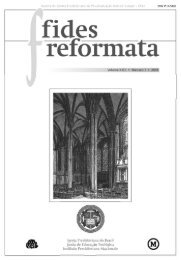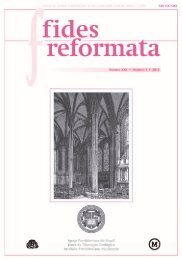Fides 22 N2
Um publicação do Centro Presbiteriano de Pós-graduação Andrew Jumper.
Um publicação do Centro Presbiteriano de Pós-graduação Andrew Jumper.
You also want an ePaper? Increase the reach of your titles
YUMPU automatically turns print PDFs into web optimized ePapers that Google loves.
ELIAS MEDEIROS, THE REFORMERS AND MISSIONS<br />
fallacious theory intended to please Roman Catholics. First, it is mentioned<br />
by Warneck. Now, it is broadcast by Latourette. It assumes that the monks<br />
were really spreading the biblical faith and that the Protestants should have<br />
established Protestant orders. Calvin was not opposed to the Roman Catholic<br />
orders just because he was anti-everything that was Catholic. It was due to his<br />
ecclesiology. 53 The reformers believed that it was the role and the responsibility<br />
of the church through its leadership, especially its ordained ministers, to train,<br />
support, and send those preachers with the ecclesiastical authority to preach<br />
the gospel. Calvin was ecclesiocentric, not para-church oriented. 54 Para-church<br />
organizations have become the clutches of the local body of believers. Most<br />
local churches and denominations are not willing or are limited in their ability<br />
to take over the responsibility of reaching out to the world with the gospel.<br />
Every mission agency and mission organization should be accountable theologically,<br />
strategically, and financially to the local body of believers. After all<br />
they recruit their workers and support from the local churches.<br />
Sixth, “the chief reason why in general Protestants were not active in<br />
propagating the faith among non-Christians was that until the seventeenth<br />
and eighteenth centuries they had relatively little touch with non-Christian<br />
peoples.” The question is: was such “little touch” due to their indifference<br />
and unwillingness to reach out to the Moslems and to pagans? Was not John<br />
Calvin interested in reaching out to the pagan Roman Catholics as well as the<br />
natives in the Americas?<br />
2.2 Stephen Neill: main arguments<br />
The late Stephen Neill (1900-1984) is the historian who does not borrow<br />
his position from Gustav Warneck (1834-1910), as most of the other Protestant<br />
historians do. His arguments are deduced from oversimplified and generalized<br />
observations: “In the Protestant world, during the period of the Reformation<br />
there was little time for thought of missions. Protestants everywhere wasted<br />
their strength, with honourable but blind and reckless zeal in endless divisions<br />
and controversies.” 55 It is understandable that Neill would look at doctrinal<br />
controversies in such light terms. His inclusivist ecumenical concerns as an<br />
active historian of the World Council of Churches would lead him to foster such<br />
53 Calvin’s “ecclesiocentric” concerns will be considered in chapter 5. At least two dissertations<br />
on this subject are already available. See Carl David Stevens, Calvin’s Corporate Idea of Mission. Ph.D.<br />
diss., Westminster Theological Seminary, 1992; and Peter Jonathan Wilcox, “Restoration, Reformation<br />
and the Progress of the Kingdom of Christ: Evangelisation in the Thought and Practice of John Calvin,<br />
1555-1564” Ph.D. diss., University of Oxford, 1993.<br />
54 See Peter Jonathan Wilcox, “Restoration, Reformation and the Progress of the Kingdom of<br />
Christ....”<br />
55 Stephen Neill, A History of Christian Missions. Revised for the Second Edition by Owen<br />
Chadwick (London: Penguin Books, 1990), 187-188.<br />
152




